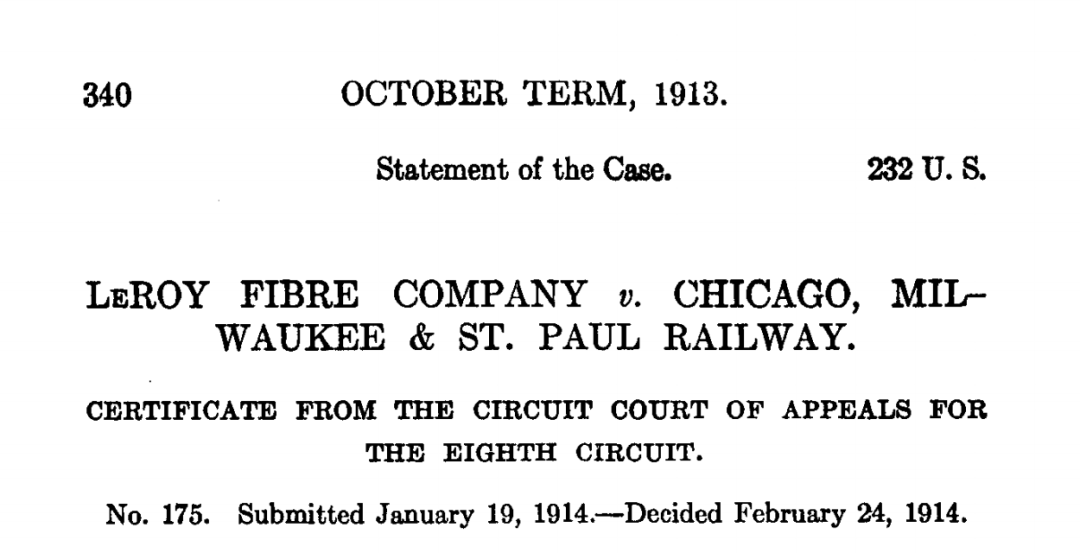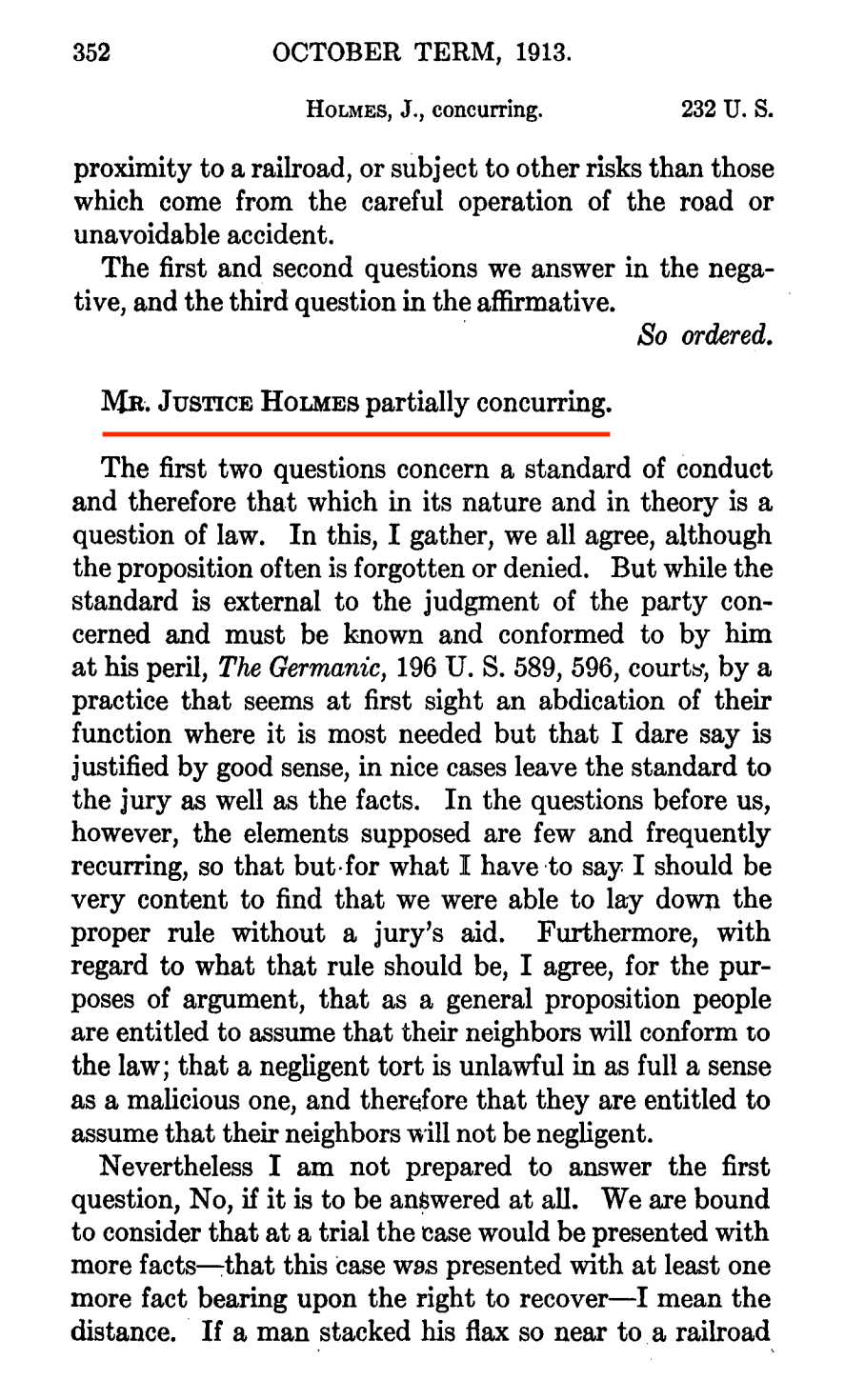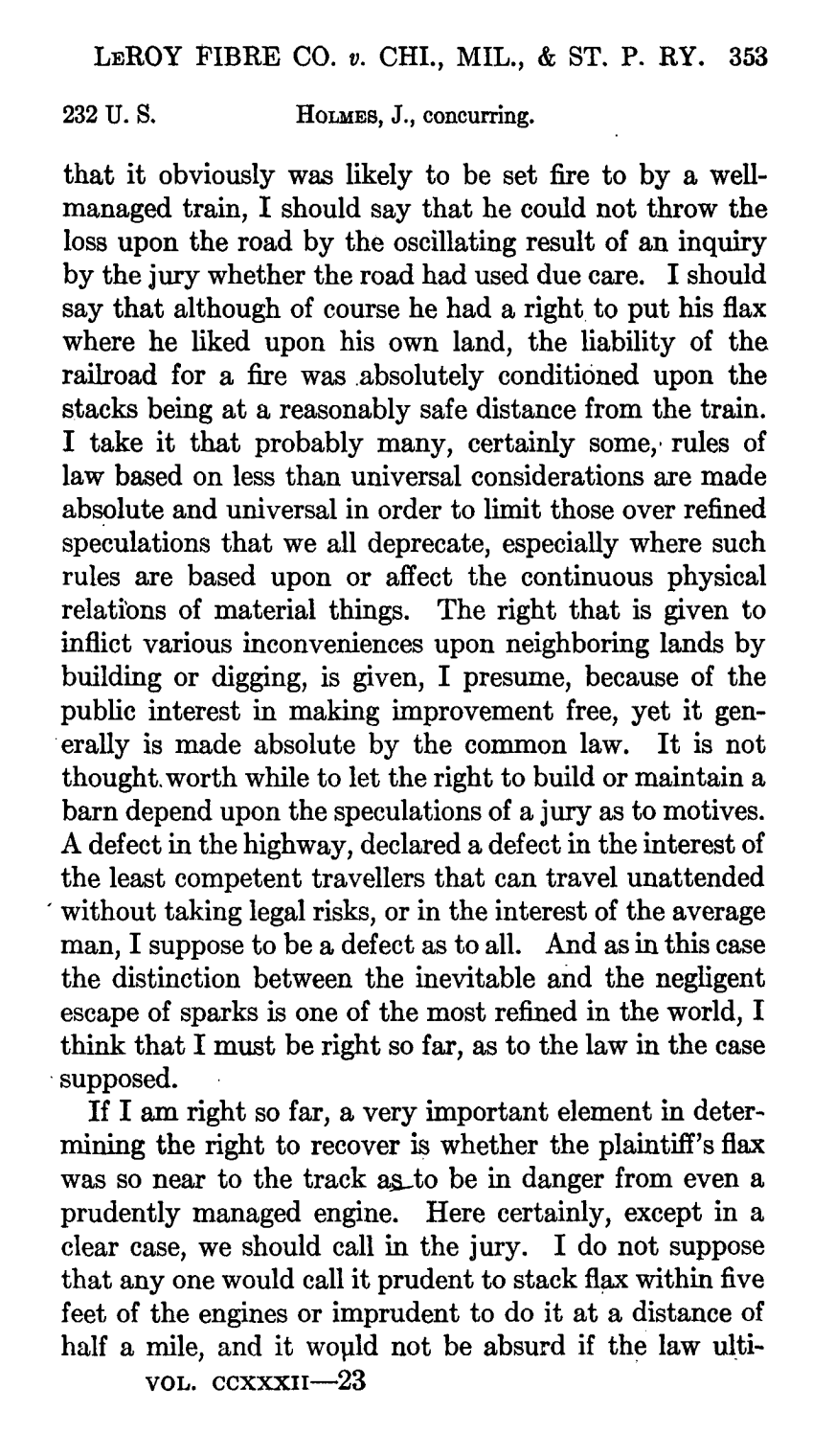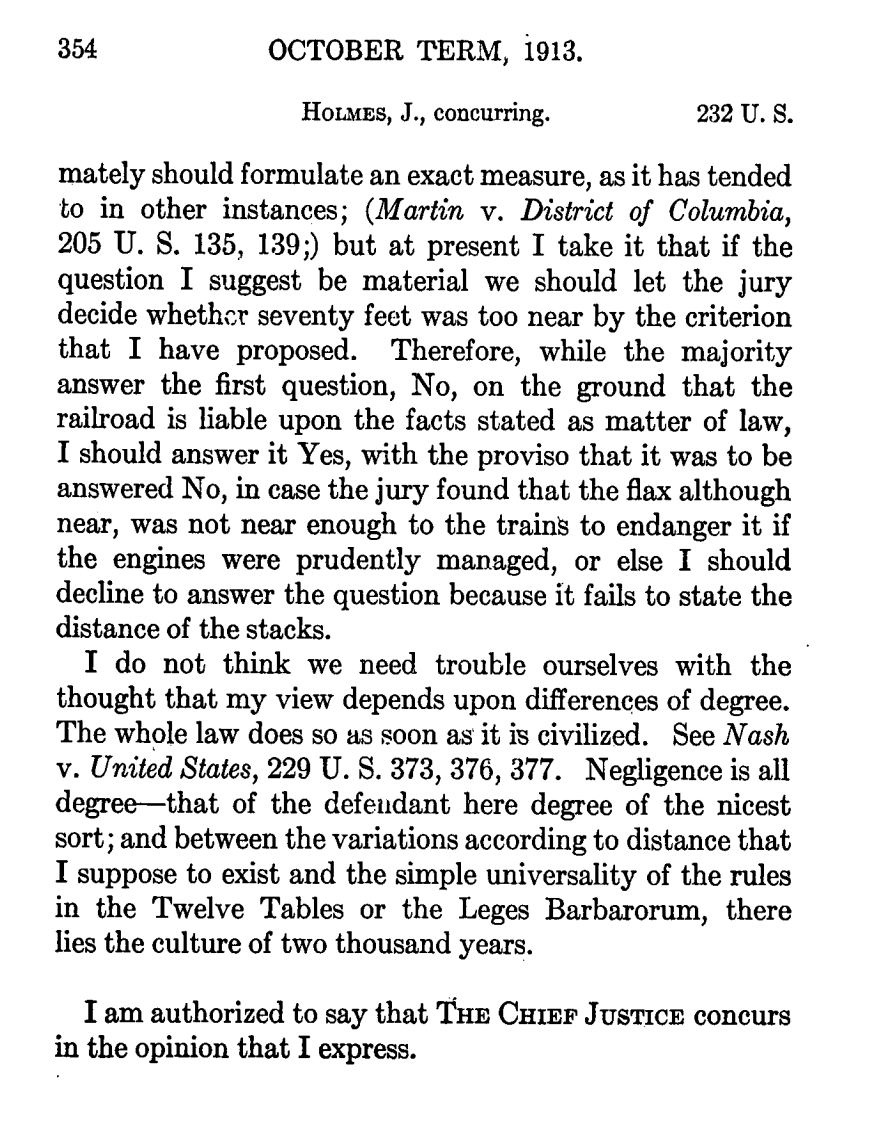
这起案件的名称是:LeRoy Fibre Co. v. Chicago, Milwaukee and St. Paul Ry., 232 U.S. 340 (1914)
翻译过来是:莱罗伊纤维公司诉芝加哥、密尔沃基和圣保罗铁路公司。

1.几个可以用来查证的链接
1)判决原文网址,美国国会图书馆官网:
https://www.loc.gov/item/usrep232340/
2)可以在这里查看案件概要:
https://supreme.justia.com/cases/federal/us/232/340/
2.下面我用AI总结的法庭意见(Opinion of the Court)概要:
1)财产使用的权利:法庭认为,一个人合法使用自己的财产,不能因为另一个人非法使用其财产而受到限制。这意味着,如果一个人在自己的土地上合法地储存了易燃物品,而铁路公司的疏忽操作导致了火灾,那么铁路公司应对火灾造成的损失负责。
2)疏忽责任:法庭指出,如果财产所有者在其土地上储存了易燃物品,并且这些物品因铁路公司的疏忽操作而遭到火灾毁坏,那么铁路公司应对火灾承担责任。法庭认为,财产所有者在其土地上的使用是合法的,且没有义务预见或防范铁路公司的疏忽行为。
3)共同过失原则:法庭认为,在这种情况下,共同过失原则并不适用。即使财产所有者在其土地上储存了易燃物品,且这些物品因铁路公司的疏忽操作而遭到火灾毁坏,财产所有者也不因其储存行为而承担共同过失责任。
4)铁路公司的疏忽:法庭认为,铁路公司的疏忽是导致财产损失的直接原因。因此,即使财产所有者在其土地上储存了易燃物品,铁路公司仍需对其疏忽操作导致的损失承担责任。
5)财产的合法使用:法庭强调,财产所有者有权合法使用其财产,且不应因其财产与铁路相邻而受到限制。铁路公司的运营,无论是疏忽还是谨慎,都不应影响财产所有者对其财产的合法使用。
6)最终裁决:法庭最终裁决,财产所有者在其土地上储存易燃物品的行为,不应被视为疏忽,因此铁路公司应对火灾造成的损失承担责任。
霍姆斯大法官部分同意,他认为行为标准是一个法律问题,这是一个理论上和本质上的问题。他认为,尽管这一命题经常被遗忘或否认,但我们都同意这一点。然而,尽管标准是当事人判断之外的,并且他必须知道并在危险中遵守,但法院在一些微妙的情况下,将标准和事实留给陪审团来判断,这种做法在第一眼看来似乎是放弃了他们在最需要的地方的功能,但他敢说这是出于常识的正当化。霍姆斯大法官进一步指出,如果一个人将亚麻堆放得离铁路太近,以至于明显可能会被管理良好的火车引发火灾,那么他不能通过陪审团摇摆不定的调查结果,将损失推给铁路。他认为,尽管一个人当然有权在自己的土地上随意堆放亚麻,但铁路对火灾的责任绝对取决于堆垛是否与火车保持了合理的安全距离。他还提到,如果法律最终应该制定一个确切的度量标准,就像它在其他情况下所倾向的那样,那么在确定赔偿权利时,一个非常重要的因素是原告的亚麻是否离轨道太近,以至于即使是管理得当的引擎也有危险。在这种情况下,除非是明显的情况,我们应该召集陪审团。霍姆斯大法官认为,他同意多数人的观点,即根据法律事项陈述的事实,铁路应承担责任,但他会附带条件地回答第一个问题,即如果陪审团发现亚麻虽然近,但距离火车不够近,以至于如果引擎谨慎管理就不会危及它,那么应该回答否,或者他应该拒绝回答问题,因为问题没有说明堆垛的距离。最后,霍姆斯大法官指出,他不认为我们需要担心他的观点取决于程度的差异。法律一旦文明化,整个法律都是如此。他被授权说,首席大法官同意他表达的意见。 MR. JUSTICE HOLMES partially concurring.
霍姆斯大法官部分同意。
The first two questions concern a standard of conduct and therefore that which in its nature and in theory is a question of law. In this, I gather, we all agree, although the proposition often is forgotten or denied. But while the standard is external to the judgment of the party concerned and must be known and conformed to by him at his peril, in The Germanic case, 196 U.S. 589, 596, the court, by a practice that seems at first sight an abdication of their function where it is most needed but that I dare say is justified by good sense, in nice cases leave the standard to the jury as well as the facts. In the questions before us, however, the elements supposed are few and frequently recurring, so that but-for what I have to say I should be very content to find that we were able to lay down the proper rule without a jury's aid. Furthermore, with regard to what that rule should be, I agree, for the purposes of argument, that as a general proposition people are entitled to assume that their neighbors will conform to the law; that a negligent tort is unlawful in as full a sense as a malicious one, and therefore that they are entitled to assume that their neighbors will not be negligent.前两个问题涉及行为标准,因此从本质上和理论上讲是法律问题。在这方面,我认为我们都同意,尽管这个命题经常被遗忘或否认。但是,虽然标准对当事人的判断是外在的,并且他必须知道并在危险中遵守,正如在“日耳曼号”案件中,196 U.S. 589, 596,法院通过一种看似在最需要的地方放弃了它们的职能的做法,但我敢说这是出于常识的正当化,在棘手的情况下,将标准连同事实留给陪审团。然而,在我们面前的问题中,所假设的要素是少数且频繁出现的,所以我应该非常乐意发现我们能够在没有陪审团帮助的情况下制定适当的规则。此外,关于那个规则应该是什么,我同意,为了论证的目的,作为一般命题,人们有权假设他们的邻居会遵守法律;过失侵权在完全意义上是违法的,就像恶意侵权一样,因此他们有权假设他们的邻居不会疏忽。Nevertheless, I am not prepared to answer the first question, No, if it is to be answered at all. We are bound to consider that at a trial the case would be presented with more facts—that this case was presented with at least one more fact bearing upon the right to recover—I mean the distance. If a man stacked his flax so near to a railroad that it obviously was likely to be set fire to by a well-managed train, I should say that he could not throw the loss upon the road by the oscillating result of an inquiry by the jury whether the road had used due care. I should say that although of course he had a right to put his flax where he liked upon his own land, the liability of the railroad for a fire was absolutely conditioned upon the stacks being at a reasonably safe distance from the train. I take it that probably many, certainly some, rules of law based on less than universal considerations are made absolute and universal in order to limit those over-refined speculations that we all deprecate, especially where such rules are based upon or affect the continuous physical relations of material things. The right that is given to inflict various inconveniences upon neighboring lands by building or digging, is given, I presume, because of the public interest in making improvement free, yet it generally is made absolute by the common law. It is not thought worth while to let the right to build or maintain a barn depend upon the speculations of a jury as to motives. A defect in the highway, declared a defect in the interest of the least competent travellers that can travel unattended without taking legal risks, or in the interest of the average man, I suppose to be a defect as to all. And as in this case the distinction between the inevitable and the negligent escape of sparks is one of the most refined in the world, I think that I must be right so far, as to the law in the case supposed.然而,如果非要回答第一个问题,我还没有准备好回答“不”。我们必须考虑在审判中案件会有更多的事实呈现——这个案件至少有一个额外的事实影响到赔偿权利——我的意思是距离。如果一个人把亚麻堆得离铁路太近,以至于很明显可能会被管理良好的火车引发火灾,我会说他不能通过陪审团摇摆不定的调查结果,将损失推给铁路,调查铁路是否尽到了应有的注意。我会说,尽管他当然有权在自己的土地上随意堆放亚麻,但铁路对火灾的责任绝对取决于堆垛是否与火车保持了合理的安全距离。我认为,可能有很多,肯定有一些,法律规则基于不那么普遍的考虑而制定,但为了限制我们所有人都谴责的过度精细的推测,这些规则被绝对化和普遍化,特别是当这些规则基于或影响物质事物的连续物理关系时。通过建造或挖掘赋予对邻近土地造成各种不便的权利,我认为是因为公共利益在于使改进自由,然而它通常被普通法绝对化。人们认为不值得让建造或维护谷仓的权利取决于陪审团对动机的推测。公路上的缺陷,被宣布为最不胜任的旅行者的利益中的缺陷,他们可以在不承担法律风险的情况下无人陪伴地旅行,或者根据一般人的利益,我认为对所有人来说都是缺陷。由于在这个案例中,不可避免的和疏忽的火星逃逸之间的区别是世界上最微妙的,我认为我到目前为止是对的,就假设案例中的法律而言。If I am right so far, a very important element in determining the right to recover is whether the plaintiff's flax was so near to the track as to be in danger from even a prudently managed engine. Here certainly, except in a clear case, we should call in the jury. I do not suppose that anyone would call it prudent to stack flax within five feet of the engines or imprudent to do it at a distance of half a mile, and it would not be absurd if the law ultimately should formulate an exact measure, as it has tended to in other instances; (Martin v. District of Columbia, 205 U. S. 135, 139.) But at present I take it that if the question I suggest be material, we should let the jury decide whether seventy feet was too near by the criterion that I have proposed. Therefore, while the majority answer the first question, No, on the ground that the railroad is liable upon the facts stated as matter of law, I should answer it Yes, with the proviso that it was to be answered No, in case the jury found that the flax, although near, was not near enough to the trains to endanger it if the engines were prudently managed, or else I should decline to answer the question because it fails to state the distance of the stacks.如果我到目前为止的理解是正确的,决定赔偿权利的一个非常重要的因素是原告的亚麻是否离轨道太近,以至于即使是管理得当的引擎也会处于危险之中。在这里,当然,除非是明显的情况,我们应该召集陪审团。我不认为任何人会认为在引擎五英尺内堆放亚麻是谨慎的,或者在半英里的距离堆放是不谨慎的,如果法律最终应该制定一个确切的度量,就像它在其他情况下所倾向的那样;(马丁诉哥伦比亚特区案,205 U. S. 135, 139。)但目前我认为,如果我建议的问题是实质性的,我们应该让陪审团根据我提出的标准来决定七十英尺是否太近。因此,虽然多数人基于铁路根据所述事实作为法律事项负有责任的理由,回答第一个问题为否,我应该会回答是,但附带条件是,如果陪审团发现亚麻虽然近,但距离火车不够近,以至于如果引擎谨慎管理就不会危及它,那么应该回答否,或者我应该拒绝回答问题,因为问题没有说明堆垛的距离。I do not think we need trouble ourselves with the thought that my view depends upon differences of degree. The whole law does so as soon as it is civilized. See Nash v. United States, 229 U. S. 373, 376, 377. Negligence is all degree—that of the defendant here is of the nicest sort; and between the variations according to distance that I suppose to exist and the simple universality of the rules in the Twelve Tables or the Leges Barbarorum, there lies the culture of two thousand years.
I am authorized to say that THE CHIEF JUSTICE concurs in the opinion that I express.我不认为我们需要担心我的观点取决于程度的差异。一旦法律文明化,整个法律都是如此。参见纳什诉美国案,229 U. S. 373, 376, 377。疏忽都是程度——这里的被告是程度最微妙的那种;而在我认为存在的根据距离变化和十二铜表法或蛮族法的简单普遍性规则之间,存在着两千年的文化。




